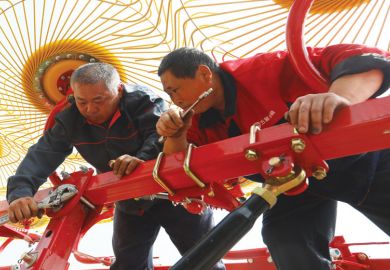At the beginning of the year, Jeffrey Sachs's report for the United Nations, Inve sting in Development , said: "The long-term driving force of modern economic growth has been science-based technological advance." Tony Blair's Commission for Africa concluded that action to strengthen science, engineering and technology capacity is "an imperative for Africa". In this year's Reith Lectures, Alec Broers argues that "technology provides the means for the Third World to join the First World". Never before has technology held such a prominent place in debate about international development policy.
The role of academic journals in this debate should be to strengthen our understanding of how technology contributes to human development and environmental sustainability and of how that contribution can be enhanced. Academic research should inform international development policy and practice.
This is what the International Journal of Technology Management and Sustainable Development set out to do when it appeared. The editors sought "to provide expert and interdisciplinary insight into the technology dimension of the problem of international development with the view to advancing contemporary knowledge about empirical and theoretical aspects of technology management and sustainable development from the perspective of developing countries". Three volumes and nine issues on, how well does it do this? TMSD (the preferred acronym) provides a mix of conceptual and empirical papers with abstracts on its website. A couple of the issues are themed, with editorial introductions, and others have two or three papers addressing common questions. Book reviews feature in some issues. The papers do not so much break new ground as provide refinements to concepts or additional knowledge about innovation and the management of technical change in the real world. Like most academic papers, they stop short of recommendations for policy or practice, except in the most general terms.
This is not to say policymakers and practitioners would have nothing to learn from the journal.
The published papers share a few key concepts. The first is that the focus of attention should be technological capabilities, at either company or national level. The questions being explored relate to how technological capability is acquired, which lead to discussions of learning and knowledge transfer. This links to a second concept, that of national innovation systems as the focus for policy, on the premise that innovation is a non-linear process that depends on institutions and networks of relations between institutions.
Underlying much of the analysis is the idea that knowledge is a social construct, determined by context. This leads to recognition of the need for a holistic approach to the management of change. But readers interested in the social, environmental and political dimensions of technology will find little to satisfy them in this journal.
TMSD does provide a publishing outlet for researchers in the field of innovation and technology for economic and human development. Specifically and importantly, the editors aim to provide an outlet for researchers from developing countries. While papers from several leading academics in the field based in the North are included, a significant number are by authors from the South, notably China and Brazil. In a further effort to be global, the editors have included two papers in French (out of 40), with abstracts in English. But there are no abstracts in French for the English papers, let alone anything in Spanish.
To be truly international, the publishers need to take greater pains to be multilingual.
Andrew Scott is research fellow, Centre for Economic Policy Research, London.
International Journal of Technology Management and Sustainable Development
Editor - Mohammed Saad and Girma Zawdie
Publisher - Intellect, three times a year
Price - Institutions £140.00, individuals £30.00
ISSN - 1474 48
Register to continue
Why register?
- Registration is free and only takes a moment
- Once registered, you can read 3 articles a month
- Sign up for our newsletter
Subscribe
Or subscribe for unlimited access to:
- Unlimited access to news, views, insights & reviews
- Digital editions
- Digital access to THE’s university and college rankings analysis
Already registered or a current subscriber?



